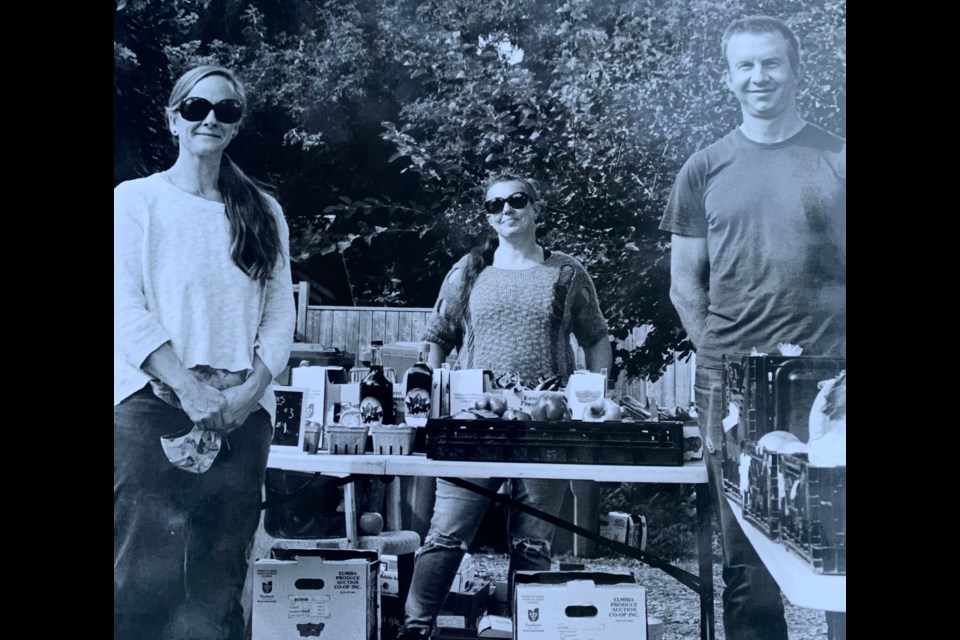When the doors of the former Tytler Public School closed at the beginning of the pandemic, members of Two Rivers Neighbourhood Group were left with a problem: They couldn’t use the space to run their food programs.
Luckily, one of their members stepped up by opening their driveway to be used to keep these services going.
“At a time of crisis when the community needed us the most, we weren't even able to help because we were locked away from the stuff that we needed to help,” said Alisha Arnold, a Two Rivers neighbourhood support worker who volunteered to use her home as a location to help rebuild the food programs.
Arnold, who lives across the street from Tytler, said the decision "just made sense."
“People needed stuff more so once COVID began, and as it goes on, people who weren't necessarily food insecure before are becoming food insecure because they lost their job or whatever the case may be."
Starting at the end of the driveway, Arnold explains the program had people call and book an appointment to pick up a bag of food, which Alisha would watch from the top of the driveway to ensure the bag was going to the right person. During the pandemic, Two Rivers also decided to temporarily close its farmers market, converting the market to a box subscription instead.
As restrictions slowly loosened, Two Rivers reopened its farmers market on Wednesdays. It also offers fresh food boxes on Mondays, food support for residents by appointment on Thursdays and Free Food Fridays.
“At Tytler we had an emergency food cupboard that, during office hours, where anybody could come into the school and just help themselves," she said about the origins of Free Food Fridays, “We didn't really have a space where we could do that, so we started Free Food Fridays and we put out whatever we had and during the weekend, anyone could help themselves to it."
By taking the program from the basement office of Tytler Public School to her driveway, Arnold adds it increased accessibility for all residents and opened them up to more people.
“It has become easier for folks to access that have physical limitations,” said Arnold. “I think it's also more people are aware of it, because you drive by and there’s a sign on the tree in front of my house, and a bunch of tables that have food on them.”
She adds there were some initial challenges in running the program from her home, including a rodent problem after keeping non-perishable food items in her basement.
“There's a lot of challenges with working from home, I think it's really hard to draw the line between Alisha who runs Two Rivers and Alisha from home at times,” Arnold said. “There were a lot of people who were coming to my door, and knocking on my door if there wasn't food out there and asking for food, and it was really challenging for me to draw a line there where I wasn't ignoring a need by allowing myself to have boundaries around my space."
Despite this, Arnold said running the program has gotten a lot better. A Two Rivers shed was also installed in the side yard of Alisha’s home to keep non-perishable food items. The shed was brought into Arnold’s yard by Two Rivers volunteers.
This August, Transition Guelph and Woodside Root Cellars also volunteered their time and resources to renovate Arnold’s basement to store fresh food. Arnold explains the basement was designed to be rodent-free.
“It’s designed to be completely secure, it’s got metal wiring on the walls that nothing can chew through,” said Arnold. “There’s no way for anybody to get through that room except for the door.”
Now with the weather getting colder, Two Rivers will need to figure out how to run its programs during the winter months.
“As the weather gets colder, things start to freeze quicker,” said Arnold. “We’re trying to figure out a better system for the winter because last year it was just trial and error.”
She adds it has been great to see the community step up to support their programming, including organizations like HOPE House and Ignatius Jesuit Centre.
"The more people got to know about it, the more stuff that was getting dropped off," said Arnold.
With more people starting to depend on food programs within Guelph, she mentions she would love to see more no-questions-asked services in the city.
“I think in order to use a lot of the (food) services you need to provide a lot of personal information, a lot of red tape to go through and I get the reasons for that and I understand why a lot of the bigger organizations use those policies and procedures, but it would be really great to see some more, no questions asked, here;s some food, take it if you need it,” said Arnold.
Two Rivers may continue its programs out of Arnold’s driveway. Arnold explains the experience of having no access to the only space that they had was tricky and challenging.
“Something that became really clear to me when all that happened was that people needed food, and our food was locked in a building that we didn’t have access to,” said Arnold, adding a lot of the food locked in the school went bad as a result.
"I've often said to my coworkers, even if community use of schools opened up and invited us back to the space, I don't think I would move our food programs there, because what we learned is that in a crisis we're not going to have access to it," she said.
"Until we can find a permanent space that wouldn't lock us out under those circumstances, or would still have access to in those circumstances, I don't think we would be comfortable moving our food, our work, back into there."
